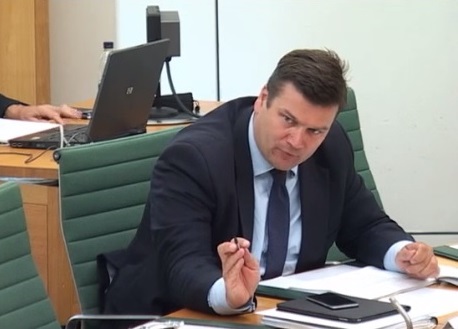
James Heappey MP is concerned that energy policy may become buried under the wider brief of the new Department for Business, Energy and Industrial Strategy.
The newly formed Department for Business, Energy and Industrial Strategy (BEIS) could see energy policy relegated to a ‘steady as she goes’ approach while other policy areas take precedence, according to a government MP in the energy and climate change (ECC) select committee.
James Heappey has expressed concerns that the combination of energy with two other briefs could see the policy area put on the backburner, with less developed technologies falling by the wayside despite their potential.
Speaking this morning at an event organised in London by the Energy and Climate Intelligence Unit (ECIU), the member for Wells who has served on the ECC committee since July last year, said: “My concern is that if you bury energy within a much broader portfolio for a minister, [then] the easy option wins through at every stage.
“I think that energy clearly needs to sit within one department that is setting energy policy. With business and industrial strategy and energy all being within one department, I am nervous that that department might come to see energy policy as a 'steady as she goes', 'let's just make sure the lights stay on', 'supply is secure and then everyone is happy'.”
Referring to Greg Clark’s new department as “BIS [former Department of Business, Skills and Innovation] with energy as an afterthought”, Heappey claimed that renewables could suffer as a result of the departmental change, particularly from the perception of technologies like solar and demand side response (DSR) as frivolous environmental concerns.
“I hope that Greg Clark will be receptive to the idea that renewables are not the devil, they are not just subsidy junkies. Renewables are an opportunity for the government,” he said.
“The problem with the narrative has been that we're doing this stuff because it’s green, because it decarbonises. Actually in my view, there's no problem with saying that we're doing all this stuff because it is an industrial, technological and economic opportunity from which there is also the by-product of it achieving our decarbonisation targets as well. I hope he sees those opportunities.”
“
I hope that Greg Clark will be receptive to the idea that renewables are not the devil, they are not just subsidy junkies. Renewables are an opportunity for the government.
Climate change as a cross government priority
Despite his concerns over the role of energy policy in the new department, Heappey was quick to praise the potential of shifting climate change away from a named department and spreading the agenda across a wider spectrum of government.
Theresa May’s decision to axe climate change from any named department brief has drawn the ire of many across the green sector, who have claimed that the decision sent a signal to the international community that the UK is not as committed as it had been in the past. However, Heappey believes tackling climate change may become a more widespread theme under May’s new government.
“I'm very comfortable with the loss of climate change as being explicitly named on a Whitehall department. Other departments have been less motivated by climate change because they didn't consider it explicitly their thing; they were more focused on other issues,” he said.
He went on to call for climate change to become the responsibility of the Cabinet Office in order for it to become “a genuinely cross-departmental effort that all departments were being held to account over”. He added that this would represent “an opportunity not a threat” for climate change action.
However, BEIS released a briefing note on Tuesday explaining that it would be responsible for climate change as well as energy, business and industrial strategy. It claimed the merger between the former departments would enable a ‘whole economy approach’ when working towards the UK’s targets but effectively ends speculation by Heappey and others that climate change would become a more central issue for government.
Despite these concerns, it is likely that Heappey and his colleagues on the ECC committee will be unable to scrutinise the new government’s activities. Following the formation of the BEIS department, it remains unclear how the current ECC and BIS committees will be formed to scrutinise the newest government department.

